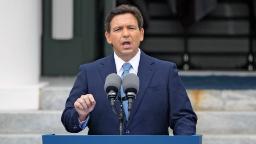

CNN
—
Gov. Ron DeSantis may soon get to pick the people who govern Disney’s Orlando-area theme parks, a move that would give the Republican leader new authority over the state’s largest employer and a recent political foe.
Republican lawmakers on Monday unveiled a bill to turn over control of Disney’s special taxing district, called the Reedy Creek Improvement District, to a five-member board chosen by DeSantis. The proposal also comes with a rebrand; Reedy Creek would become the “Central Florida Tourism Oversight District.”
The move to take over Reedy Creek is the latest step in a yearlong spat between DeSantis and Disney over a bill to restrict certain classroom instruction about sexual orientation and gender identity. DeSantis signed the bill into law over the objections of Disney’s then-CEO Bob Chapek.
In an act opponents decried as political retribution, DeSantis then pushed lawmakers to dissolve the Reedy Creek Improvement District, which for 55 years effectively gave Disney control of the land around its Florida properties. Republicans, who control the seats of legislative power, complied, and the district was scheduled to be sunset on June 1.
But the bill proposed Monday breathed new life into the taxing district and kept many of its special powers. Indeed, the final page of the 189-page bill states clearly: “The Reedy Creek Improvement District is not dissolved as of June 1, 2023, but continues in full force and effect under its new name.”
In a statement to CNN, Jeff Vahle, the president of Walt Disney World Resort, said the company is “monitoring the progression of the draft legislation, which is complex given the long history of the Reedy Creek Improvement District.”
“Disney works under a number of different models and jurisdictions around the world, and regardless of the outcome, we remain committed to providing the highest quality experience for the millions of guests who visit each year,” Vahle said.
The bill, introduced by state Rep. Fred Hawkins, also seeks to limit the damage that could be done to Disney, one of the state’s most vital tourism engines, and to taxpayers. It makes clear that the changes to Reedy Creek should not affect the district’s existing debt, previously estimated at about $1 billion, or any other contracts. Local governments last year expressed concern that dissolving Reedy Creek could lead to a debt bomb on the residents of Orange and Osceola counties. Reedy Creek, in a statement to bondholders last year, said the state couldn’t dissolve it without paying off its debt, or it would violate a 1967 state law.
The legislation would also remove some powers from the board, like the ability to build an airport or a nuclear power plant.
Democrats criticized the legislation, which was introduced in a special session called in part to address Reedy Creek’s future, while stopping short of endorsing Disney’s unique arrangement in Central Florida. State Sen. Jason Pizzo, a Miami Democrat, said Disney was “not a sympathetic victim in my book,” citing the company’s recent labor fight with unionized workers at Disney World. But he said that “the market should dictate these situations” and likened DeSantis moving in on a private company to “socialism.”
State Rep. Anna Eskamani, an Orlando Democrat, said of the bill: “Disney still gets perks but they’re now a political prisoner of the governor.”
DeSantis is supportive of the changes, which are likely to pass the Republican-controlled legislature within the next couple weeks.
“These actions ensure a state-controlled district accountable to the people instead of a corporate-controlled kingdom,” DeSantis spokesman Jeremy Redfern said.
Under existing law, the board for Reedy Creek has been made up of landowners with close ties to Disney. The bill introduced Monday makes clear that none of the appointees chosen by the governor can be recent Disney employees or their relatives, nor that of a competitor. The state Senate, where Republicans currently hold a super majority, would have final approval of the appointees.
In addition to addressing Reedy Creek, this week’s special session will also address two other contentious DeSantis priorities. Lawmakers have proposed allowing the DeSantis administration to transport migrants from anywhere in the United States, a significant expansion of a program that gained national attention last year after Florida paid for two flights that carried migrants from San Antonio, Texas, to Martha’s Vineyard in Massachusetts.
The state House and Senate will also consider giving DeSantis’ controversial new Office of Elections Crimes and Security the jurisdiction to prosecute crimes involving elections. The proposal comes after DeSantis initiated a crackdown on voter fraud that resulted in the arrest of 20 individuals but hit a legal snag when a judge dismissed a case against a Miami defendant on the grounds that state prosecutors had acted beyond their authority.
This story has been updated with additional information.
